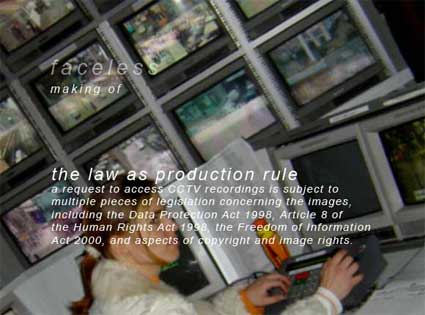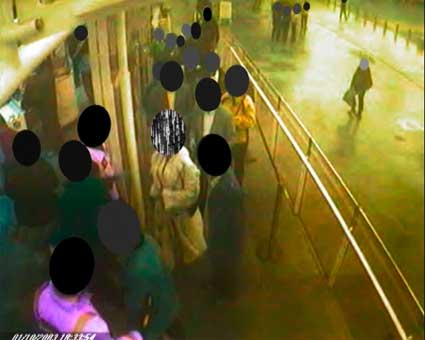Filmmaker Manu Luksch had a talk about and an installation of her project Manifesto for CCTV Filmmakers at ars electronica this year. Her work made vivid and almost tangible the relevance of the symposium's theme this year: Goodbye Privacy.

The manifesto establishes rules, procedures, and identifies issues useful for filmmakers who want to the costs of creating a movie - by using images captured by CCTV cameras.
Her text follows closely the Data Protection Act (DPA) 1998 and related privacy legislation that gives the subjects of data records access to copies of the data. The manifesto can be adapted for different jurisdictions.
The artist demonstrated the validity of her manifesto with the movie Faceless. Sadly the movie was not shown at ars, only the Making of.
Under the DPA, one has the right to retrieve data which is held upon oneself, while the faces of anyone else captured on it have to be blacked out. She therefore claimed the as much CCTV footage of herself as she could and created a story set in the future, in the "faceless world" - with herself as the only woman with a face.

No specialist equipment nor cameras were involved. The movie was made in London, the city which has the highest density of CCTV surveillance camera on Earth and the capital of a country that is getting increasingly Orwellian.
"My requests were more often than not replied to in an inadequate or uninformed way - the controllers had clearly not heard of the Data Protection Act," she told the BBC. She'd either get no reply - despite the law stating requests for images must be responded to in 40 days - or would be told no images could be provided. Others attempted to charge thousands of pounds for "post-production", even though the DPA says that only a standard fee of £10 can be charged.
"There are lots of aspects of this legislation which are clearly neglected on a daily basis," she added.
Extract of the movie Faceless, 2006
Marie Lechner interviews Manu Luksch (in french). Images. Eutopia has another interview, this time in german.

